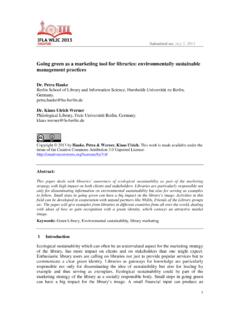Transcription of Challenges and problems of Library and Information Science ...
1 Submitted on: June 30, 2013 1 Challenges and problems of Library and Information Science Education in Selected African countries Peter Burnett Programme Manager, Library Curricula and Network Management, International Network for the Availability of Scientific Publications (INASP), Oxford, United Kingdom. E-mail address: Copyright 2013 by Peter Burnett. This work is made available under the terms of the Creative Commons Attribution Unported License: Abstract: It is widely acknowledged that LIS schools in many developing countries are not keeping abreast of the rapidly changing digital environment and are facing new knowledge and skills demands from employers. In the period 2008-2012 INASP supported 12 curriculum review workshops in ethiopia , Ghana, Malawi, Tanzania, Uganda, Vietnam, Zanzibar and Zimbabwe.
2 Also, in November 2012 INASP commissioned 4 research reviews to gather more up-to-date Information : (1) Assessment of LIS education in ethiopia ; (2) Investigation into the current state of LIS education in the East Africa region; (3) Tracer study of LIS education in Tanzania; (4) Empowering Library Association leaders in quality assessment for LIS education; (5) Assessment of the changing needs of Information professionals in Zimbabwe. This paper summarises the main findings. Curriculum development and support is an activity which INASP intends to intensify. These reviews will inform our future work. Not only will we continue to offer support for curriculum revision but also training in curriculum delivery with a view to improving pedagogical skills, identifying where LIS staff need new knowledge, and offering appropriate training opportunities. We also hope to encourage the formation of a network/consortium of LIS schools across partner countries to work collaboratively in areas such as teaching, research, staff and student exchanges, workshops, curriculum development and distance teaching Keywords: Library education; Curriculum development; Developing countries Introduction In April 2013 INASP ( ), the International Network for the Availability of Scientific Publications, launched a new flagship programme, Strengthening Research and Knowledge Systems (SRKS).
3 This five-year programme will work closely with 22 partner countries and will provide online scholarly literature to a further 44 in Africa, Asia and Latin America. SRKS builds directly on the achievements of the Programme for the Enhancement of Research Information (PERI) that ran from 2002 to 2012. 2 The SRKS programme encompasses: Working with publishers to ensure researchers have affordable access to the latest scholarly literature in their discipline Supporting Library consortia to negotiate successfully with publishers for the purchase of journals and books Working with Library consortia and Library and Information Science schools to train librarians in the management and effective use of digital resources Building the academic literacy and writing skills of researchers Helping developing country journals improve their publishing processes and get their content online and visible to the global scholarly community Promoting the widest possible availability of local research through Open Access Ensuring ICT staff can develop and manage university networks that allow easy access to digital resources This paper considers the background leading to our decision to work more concertedly with Schools and
4 Departments of Library and Information Science , and to support their endeavour to produce a cadre of technically competent graduate librarians able to respond to change and work in the rapidly evolving digital environment. Role of higher education Higher education institutions have responsibility for equipping individuals with the knowledge and skills required for key positions in government, business, industry and professions. They produce new knowledge through research and can transfer, adapt and disseminate knowledge as well as being important institutions of civil society. 1 The development of tertiary education is generally a core component objective in many of the national strategic plans or visions developed by the governments of our developing country partners. Zambia s Vision 2030 plan 2 emphasises the importance of investing in people through education and training to ensure job creation and socioeconomic transformation.
5 The goals advanced in Namibia Vision 2030 3 include provision of full and appropriate education at all levels in order to leverage knowledge and technology for the benefit of the people. Similarly Rwanda Vision 2020 4 recognises that in order to transform from a subsistence agriculture economy to a knowledge-based society, the secondary and tertiary education sectors need to expand in order to efficient and productive workforce. 1 Universities UK, Universities and development: global cooperation 2 3 4 3 Even in those Vision plans where education is not specifically mentioned there is an unstated assumption that the achievement of wider socio-economic and political goals is dependent on the ability of the citizens to access and use Information . The Growth of Higher Education In the decade immediately following independence many of the former colonies enjoyed considerable success in the higher education sector.
6 Unfortunately the 1980s and 1990s witnessed a slow decline partly due to the focus on primary education, but also insufficient funding and general under-investment. It is only since the beginning of this new century that the role of universities in building the knowledge economy has been recognised and universities are now slowly being rebuilt and institutions receiving more investment and support from both government and external funding agencies. At the same time the demand for access to higher education is growing rapidly. In Kenya, for example, over the past five years, Kenyatta University has seen student numbers triple from 15,000 to around 45,000. Not surprisingly therefore the Kenyan government increased funding for higher education by 30% from July 2013. Having recently upgraded 15 former constituent colleges of universities into fully fledged universities, the extra funds are to be directed to these institutions allowing them to admit more students and offer degree programmes on their own.
7 The hope is that these new universities will help admit an additional 10,000 students thereby easing the country s admissions In Ghana a new university is to be built in order to meet growing demand for higher education, bringing the number of public universities to 10. Also, 10 polytechnics are to be upgraded into technical In Zambia the government unveiled plans in 2012 to construct seven new universities, to improve currently low levels of access to higher Additionally Zambia s government is set to build a university in its Western province to be named King Lewanika University. Further, Copperbelt Secondary Teachers College has been turned into a university and is now called Mukuba University. In Chinsali in Muchinga province, Robert Makasa University is under construction, while Paul Mushindo University will be established at Lubwa in the same In Malawi the University of Malawi s strategic plan for 2012-2017 envisages increasing undergraduate student numbers from some 8,400 to 15,000, Masters enrolments from around 300 to 2,000 and PhD student numbers from 46 currently to 500 by 2017.
8 Its capacity-building targets include constructing, within five years, four new auditoriums, 16 lecture theatres, seven laboratory complexes, four engineering 5 World news, Africa ed. (16 March 2013) 6 University World news, Africa ed. (16 March 2013) 7 University World news, Africa ed. (30 September 2012) 8 University World news, Africa ed. (23 February 2013) 4 labs, seven office and classroom complexes and four Library extensions as well as new student accommodation, through public-private In ethiopia the number of public universities in the country has grown from two to 34 over the past 12 years, and there are now seven private universities and 52 polytechnic colleges. Around 320,000 undergraduate students currently attend public universities, and this number is targeted to reach 467,445 by 2015 under ethiopia 's five-year Growth and Transformation Plan for 2011-15.
9 There are now 15,445 postgraduate students at public universities, and this number is expected to double every year for at least the next three Given the large number of new and planned institutions, the growth of private universities in several of the countries, and the general massification of higher education, there is an imperative to constantly develop and improve the teaching and learning support offered through the Library . Indeed, in the light of the rapid changes in communication technology and scholarly communication, the shift towards learner-centred teaching, technology-assisted learning, new demands and growing expectations of scholars and students to access Information , the role of the Library is assuming ever-greater importance. Librarians are expected to undertake new roles (digitisation, copyright), add value to existing services (manage electronic collections), integrate and develop new and transformative technologies (IR, LMS, ERM), be more proactive (user oriented).
10 In this rapidly evolving environment a heavy responsibility lies with those institutions charged with producing the next generation of suitably qualified professionals. LIS Education in selected countries Numerous studies have been conducted on different aspects of LIS education in East African countries. Mammo11 identified many skills that seem to be lacking (or not practised) by LIS professionals in ethiopia : leadership, human resources management, evaluating and reporting skills, communication skills, professional ethics, marketing of Library services, teaching skills. These are in addition to the more obvious IT related skills such as gateway and portal development, web authoring, database development. In his assessment of the training of LIS professionals in Kenya Kavulya12 noted that current LIS programmes in the country do not address current job market requirements due to: inadequate teaching resources at LIS training; lack of adequate ICT content in the courses; inadequate length of courses; courses that are outright irrelevant to the job market, and inadequate industrial attachment for LIS students.




